Search Results
Search
Filter results
Advanced Filters
Your search returned 314 Solutions
-
An art exhibition making art accessible in very different ways
The Fundación ONCE International Contemporary Art Biennale is an inclusive art exhibition recognizing artists with disabilities and presenting them in an accessible way. The Biennale, which attracted 185,000 visitors in 2016, shows different forms of artistic expressions and offers art related side activities.
ONCE Foundation, Spain -
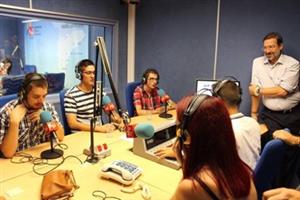
Adding a university degree to job placement
TEMPE, a fashion company runs a training programme for people with intellectual disabilities in cooperation with APSA. In 2015, Miguel Hernandez University joined the partnership, offering theoretical and practical courses to participants with a degree, which has increased their employment opportunities.
Tempe, Spain -
Employment of the hearing impaired
Sabooj is a French communications agency. In 2012 it was the only one of 500 so called "Entreprises Adaptées" (EA), with special facilities for providing employment for disabled. More than 80% of Sabooj's workers have disabilities. , i.e. hearing impairment. Sabojee has 70 clients of whom 75% are big companies.
Sabooj, Employment of the hearing impaired, France -
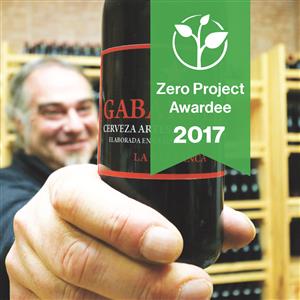
Comprehensive support to entrepreneurs with disabilities
FSC Inserta, has established entrepreneurship as an option for people with disabilities. Support includes counselling, training, guidance, and financial assistance. Some 1,500 entrepreneurial projects have been supported since the programme’s founding in 1988 and approximately 5,000 persons have received support.
ONCE Foundation, Entrepreneurship Programme FSC Inserta, Spain -
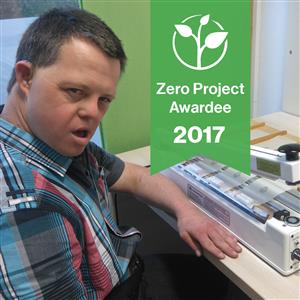
Sheltered workshops piloting ‘cooperations’ and the transition to the open labour market
With "Flachgau inklusiv" people with intellectual disabilities can choose to remain working within a sheltered workshops or take up assignments with cooperating companies or public institutions. If so, Lebenshilfe Salzburg helps with integration, after which a local mentor takes over. In 2017 the project had 20 companies as partners.
Lebenshilfe Salzburg, Flachgau inklusiv, Austria -
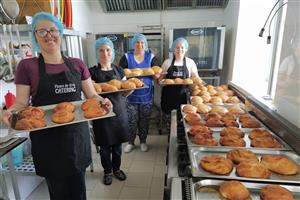
A catering service training and vocation programme
Floare de Cireş is a catering service in the town of Razeni in Modava founded in 2012 to give disadvantaged young people a chance to get their first job. In 2015 the project was extended to include a workplace training programme, which more than 100 people with disabilities had completed by 2020.
Eco-Razeni Association, Floare de Cireş, Moldova -
Meaningful employment through support
The decree defines, for the first time, supported employment and provides for ways of accessing it. By developing an individualised workplace adaptation plan with the help of specialised job coaches, the programme provides guidance, advice and support, specific training, monitoring and evaluation of the worker’s process of integration.
Ministry of Health, Social Services and Equality of Spain, Meaningful employment through support, Spain -
FRAMEWORK AGREEMENT BETWEEN THE INSTITUTE OF THE ELDERLY AND SOCIAL SERVICES AND FUNDACION ONCE
The Spanish Ministry and the private Fundación ONCE have joined forces to promote universal accessibility. A framework agreement lays out the respective financial contributions. Both partners are allowed to collaborate with other public and non-profit entities, and to apply for funding and technical support.
Ministry of Health, Social Services and Equality of Spain, Public-private partnership for accessibility, Spain -
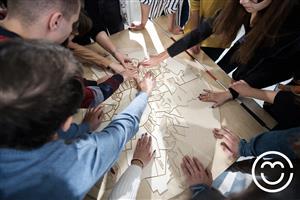
Inclusive club engaging with urban planners to create more accessibility for the blind
The Urban Mobility Club, initiated in Bucharest, is a pan-European community that promotes the inclusion of people with disabilities in the urban life through workshops and other activities. In addition to people with disabilities, representatives of the real estate sector and the administration are encouraged to participate.
The Alternative Methods of Social Integration Association, The Urban Mobility Club, Romania -
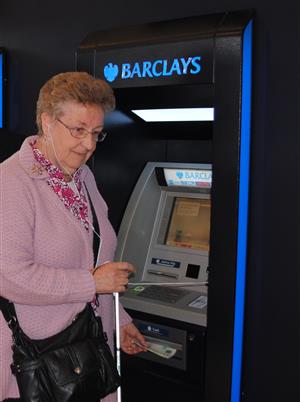
Audio-enabled ATMs (cash machines) offer independent use of banking services for blind and partially sighted persons. The success of Barclays’ Talking ATMs has led to the development of other accessible services, aspiring to make banking accessible to all.
Talking ATMs not only provide ease-of-use for visually impaired users, but also for people with dyslexia or people who are illiterate. The success of Talking ATMs has led Barclays to develop other accessible services, amongst other things high visibility debit cards and sign language interpretation via webcam.
Barclays Bank, Banking made accessible – talking ATMs, United Kingdom